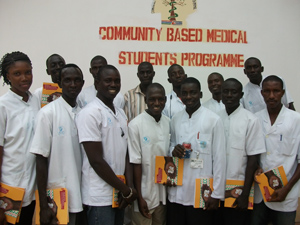Genital mutilation quadruples the risk of complications in childbirth

05/02/2013
Female genital mutilation (FGM) is a harmful traditional practice affecting 140 million women and over 3 million girls yearly in sub-Saharan Africa. Gambia is one of the countries in which FGM is most prevalent (76.3%) and Gambian women immigrants have the highest fertility rate in Spain, which makes this a problem for our country too. FGM encompasses all procedures that, intentionally and for non-medical reasons, alter or injure the female genital organs and it has negative short and long-term consequences for the health of girls and women.
Since 2010, thanks to the NGO Wassu Gambia Kafo, Gambia has had a National Plan for the Prevention and Treatment of FGM in place, implemented by the country's own Health Ministry and United Nations agencies (UNICEF, WHO and UNFPA). This plan is based on the clinical and qualitative research carried out in Gambia since 1989 under the auspices of the Universitat Autònoma de Barcelona, which has provided valuable information on how FGM is perceived by Gambian professionals and on medical complications of FGM.
Within this framework, over 1500 healthcare professionals have been given training on the consequences of FGM and how it is treated and prevented. Among these, there are lecturers and students from the Faculty of Medicine, the Community Medicine programme and Nursing and Midwifery Schools, and practising healthcare professionals, across the whole country.
The first assessment of this training, presented in the documentary "A future without mutilation", shows that these professionals, as they improved their knowledge of FGM through their education or through specific training, changed their opinion about it, a change that then cascaded down to the communities, where they are seen as legitimate agents.
This change in attitude towards an ancestral custom, deeply rooted and defended by 42% of these professionals, allowed the methodology to be piloted in the North Bank region, tackling the root of the problem by empowering community figures like imams, traditional communicators, traditional midwives and circumcisers.
CLINICAL RESULTS
The second clinical study made in Gambia on the consequences of FGM includes birth and infant complications. Data was compiled from 588 patients, women who had been given prenatal or child delivery care at health centres in western Gambia, some having experienced FGM and some not.
It was found that the patients with FGM (75.6% of the women examined) had a greater chance of suffering chronic problems like dysmenorrhea, vulvar or vaginal pain, anomalous scarring and sexual problems. Moreover, women with FGM were four times more likely to experience complications in childbirth. Infants too were four times more likely to present complications if the mother had experienced FGM. These results provide the first proof of the importance of FGM's effects on childbirth complications and infant health in Gambia.
These clinical results have been used by the vice-president of Gambia to raise awareness among religious and parliamentary leaders, and as scientific grounds to pave the way for a law banning FGM in Gambia.
DOCUMENTARY
The UAB Wassu Foundation has made a video-documentary in which students, tutors and healthcare professionals trained in Gambia tell their stories. The documentary shows how the training received has succeeded in generating a change in opinion regarding FGM. The video also contains the stories of traditional midwives, religious leaders and community figures who were trained in the final phase of this transfer of knowledge to communities.
PREVENTING FGM IN SPAIN
According to the FGM map for Spain, drawn up from census data from 2009, Spain is estimated to have over 10,000 girls at risk of suffering FGM in the next few years.
Most of these girls are Nigerian, Senegalese, Gambian or Guinean and live mainly in the regions of Catalonia, Madrid, Valencia, the Canaries, Aragon, the Balearics and the Basque Country.
The methodology used in Spain, similarly to that used in Gambia, is based on the fact that primary healthcare professionals play a key role in preventing and detecting FGM cases. Health and social services and schools, through their proximity, accessibility and universality, are the ideal spaces to approach this intercultural challenge posed by this country's new citizens.
Through the Transnational Observatory, so far, over 2,500 primary healthcare workers, social workers and teachers have been trained in Spain (Catalonia, Basque Country and Balearics).
Recently, agreements on prevention have been reached at the municipal level to implement realistic and sensitive proximity programmes, which have proved fruitful in preventing cases of FGM in African girls spending their holidays in their countries of origin.